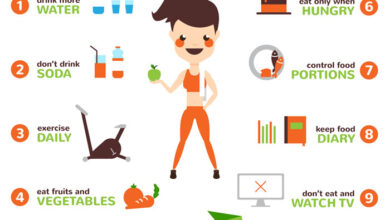
Caffeine Could Help You Burn More Fat During Exercise
Caffeine Could Help You Burn More Fat During Exercise – a statement that might sound too good to be true, but there’s actually some science behind it. Caffeine is a stimulant that has been shown to enhance athletic performance and boost metabolism.
But can it really help you shed those extra pounds? Let’s dive into the fascinating world of caffeine and its potential impact on fat burning during exercise.
Caffeine works by affecting our body’s energy systems. It increases the release of fatty acids from fat stores, making them available for energy. This process, known as lipolysis, is crucial for fat burning. Caffeine also stimulates the central nervous system, leading to increased alertness and a feeling of heightened energy.
This can translate into more intense workouts, which in turn can lead to greater calorie expenditure.
Caffeine and Exercise
Caffeine is a popular stimulant that is often consumed before exercise to enhance performance. While it is commonly known for its ability to increase alertness and focus, caffeine also exerts significant effects on the body’s energy systems, which can influence fat burning during exercise.
Caffeine’s Effects on Energy Systems
Caffeine’s impact on energy systems is multifaceted. It primarily acts as an adenosine receptor antagonist. Adenosine is a neurotransmitter that promotes relaxation and sleepiness. By blocking adenosine receptors, caffeine prevents adenosine from binding, thereby counteracting its effects and promoting wakefulness and alertness.
Furthermore, caffeine stimulates the central nervous system, leading to increased adrenaline release. This, in turn, triggers the breakdown of glycogen, the body’s primary energy source, into glucose, which is then used for energy production. This process is known as glycogenolysis.Caffeine also increases the mobilization of fatty acids from adipose tissue.
Fatty acids are another important energy source, particularly during prolonged exercise. By promoting fat breakdown, caffeine can contribute to increased fat oxidation, which is the process of burning fat for energy.
Caffeine’s Role in Fat Burning
The mechanisms by which caffeine may enhance fat burning during exercise are complex and involve several factors:* Increased lipolysis:Caffeine stimulates the breakdown of stored fat (lipolysis), making more fatty acids available for energy production.
Reduced carbohydrate utilization Caffeine can decrease the reliance on carbohydrates as an energy source, forcing the body to rely more heavily on fat for fuel. This effect is particularly pronounced during moderate-intensity exercise.
Enhanced thermogenesis Caffeine can increase the body’s metabolic rate, leading to increased energy expenditure and potentially contributing to fat loss.
Studies on Caffeine and Fat Oxidation
Numerous studies have investigated the effects of caffeine on fat oxidation during exercise. For instance, a study published in the
Journal of Applied Physiology* found that caffeine supplementation increased fat oxidation by 11% during moderate-intensity cycling.
It’s cool that caffeine can help you burn more fat during exercise, but don’t forget about the importance of fueling your workouts properly. If you’re following a low-carb diet, remember that the quality of carbs matters a lot. Choose those complex, slow-digesting carbs for sustained energy, and you’ll be maximizing your fat-burning potential during those caffeine-fueled workouts!
Another study, published in the
International Journal of Sport Nutrition and Exercise Metabolism*, demonstrated that caffeine ingestion led to a significant increase in fat oxidation during prolonged running.
These findings suggest that caffeine can be an effective ergogenic aid for enhancing fat burning during exercise. However, it’s important to note that the effects of caffeine on fat oxidation can vary depending on factors such as dose, exercise intensity, and individual characteristics.
Caffeine’s Impact on Metabolism
Caffeine, a stimulant found in coffee, tea, and other beverages, is known to have a profound impact on metabolism. Its influence extends beyond simply providing an energy boost, affecting how our bodies utilize energy and process fat.
Caffeine’s Influence on Metabolic Rate
Caffeine’s primary effect on metabolism lies in its ability to increase metabolic rate. This increase in metabolic rate is a result of caffeine’s stimulation of the central nervous system, leading to an elevation in the production of hormones like adrenaline and noradrenaline.
These hormones, in turn, trigger a cascade of events that increase energy expenditure.
Caffeine’s Role in Promoting Lipolysis
Lipolysis, the breakdown of stored fat into fatty acids, is another crucial aspect of metabolism that caffeine influences. Caffeine works by stimulating the release of fatty acids from fat cells, making them readily available for energy production. This effect is primarily mediated by the activation of an enzyme called hormone-sensitive lipase (HSL), which plays a key role in breaking down fat.
Caffeine’s Influence on Hormone Levels Related to Fat Metabolism
Caffeine’s impact on fat metabolism extends to its influence on hormone levels. Studies have shown that caffeine can increase levels of certain hormones that play a role in fat metabolism, such as:
- Glucagon: A hormone that promotes the breakdown of glycogen (stored glucose) and the release of glucose into the bloodstream. This effect can contribute to increased energy availability during exercise.
- Growth hormone: A hormone that has been linked to increased lipolysis and muscle protein synthesis. While caffeine’s effect on growth hormone is less pronounced than its effect on other hormones, it may still contribute to its overall metabolic benefits.
Exercise Intensity and Caffeine
Caffeine’s ability to enhance fat burning during exercise is influenced by the intensity of the workout. Understanding this relationship is crucial for optimizing caffeine intake for fat loss goals.
Caffeine’s Effects on Fat Oxidation at Different Exercise Intensities
The impact of caffeine on fat oxidation varies depending on the exercise intensity. During moderate-intensity exercise, caffeine can significantly boost fat burning by increasing the release of fatty acids from fat stores and enhancing their utilization as fuel.
It’s fascinating how caffeine could help you burn more fat during exercise, right? But, let’s be honest, the pandemic threw a wrench into all our fitness routines. The shift to home workouts and gym closures really impacted our health and fitness habits, as explored in this article: how covid 19 affected our health and fitness habits.
Now, as we navigate this new normal, it’s important to remember that even a little boost from caffeine can help us get back on track with our fitness goals.
- Moderate-intensity exercise, often characterized by a heart rate between 60% and 75% of your maximum heart rate, primarily relies on fat as a fuel source. Caffeine, by stimulating the release of fatty acids, enhances this process, leading to increased fat oxidation.
- High-intensity exercise, typically above 75% of your maximum heart rate, primarily utilizes carbohydrates for energy. While caffeine can still promote fat burning during high-intensity exercise, its effect is less pronounced compared to moderate-intensity workouts.
Optimal Caffeine Dosage for Different Exercise Intensities
The optimal caffeine dosage for maximizing fat burning during exercise varies depending on the intensity of the workout.
| Exercise Intensity | Optimal Caffeine Dosage (mg) |
|---|---|
| Low-Intensity (30-60% of Max Heart Rate) | 2-3 mg/kg body weight |
| Moderate-Intensity (60-75% of Max Heart Rate) | 3-6 mg/kg body weight |
| High-Intensity (75-90% of Max Heart Rate) | 3-5 mg/kg body weight |
For example, a person weighing 150 pounds (68 kg) would consume approximately 136-204 mg of caffeine for a moderate-intensity workout.
Individual Factors and Caffeine Response
Everyone responds to caffeine differently. Factors like genetics, body composition, and caffeine tolerance can influence how your body metabolizes caffeine and how it affects your fat-burning potential during exercise. Understanding these individual factors can help you optimize your caffeine intake for better workout performance and fat loss.
Genetics and Caffeine Metabolism
Genetics play a significant role in how your body processes caffeine. Some individuals have a faster metabolism rate, meaning they break down caffeine more quickly. This can lead to a shorter duration of caffeine’s effects and a lower impact on fat burning.
Conversely, individuals with slower metabolism rates may experience a longer duration of caffeine’s effects, potentially leading to increased fat oxidation.
I’m all about finding ways to optimize my workouts, and lately, I’ve been intrigued by the idea that caffeine could help me burn more fat during exercise. Of course, a healthy diet is key, and I’m always trying to make smart choices.
That’s why I’ve been researching the whole “is fake meat healthier than the real thing” debate, which has led me to some interesting articles like this one. But back to caffeine, I’m curious to see if it really can give my workouts an extra boost!
Body Composition and Caffeine’s Impact
Body composition, specifically the ratio of lean muscle mass to body fat, can influence how caffeine affects fat burning. Individuals with a higher percentage of muscle mass may experience a more pronounced effect of caffeine on fat oxidation due to the increased energy demand of muscle tissue.
This is because caffeine can stimulate the release of fatty acids from fat cells, making them available for energy production.
Caffeine Tolerance and Its Effects
Caffeine tolerance develops over time with regular consumption. As your body adapts to caffeine, you may require higher doses to experience the same effects. This can impact the effectiveness of caffeine for fat burning during exercise. Regular caffeine users may need to adjust their intake to maintain the desired benefits.
Potential Risks and Side Effects of Caffeine During Exercise
While caffeine can be beneficial for exercise performance and fat burning, it’s important to be aware of potential risks and side effects. Excessive caffeine intake can lead to:
- Anxiety and jitters:High caffeine levels can cause nervousness, restlessness, and tremors.
- Insomnia:Caffeine can interfere with sleep patterns, especially when consumed close to bedtime.
- Dehydration:Caffeine is a diuretic, which can lead to fluid loss. It’s essential to stay hydrated during exercise, especially when consuming caffeine.
- Gastrointestinal issues:Caffeine can irritate the stomach, causing nausea, heartburn, or diarrhea.
- Increased heart rate and blood pressure:Caffeine can temporarily increase heart rate and blood pressure, which may be problematic for individuals with pre-existing cardiovascular conditions.
Practical Considerations: Caffeine Could Help You Burn More Fat During Exercise

Now that we’ve explored the science behind caffeine and exercise, let’s dive into practical tips for incorporating it into your routine. Remember, caffeine is a tool, and like any tool, it’s most effective when used strategically.
Healthy Sources of Caffeine
You don’t have to rely on sugary energy drinks to get your caffeine fix. Here are some healthier options:
- Coffee:A classic choice, coffee is packed with antioxidants and can provide a sustained energy boost.
- Green Tea:This beverage offers a gentler caffeine dose along with catechins, which have antioxidant properties.
- Black Tea:Similar to green tea, black tea contains caffeine and antioxidants.
- Dark Chocolate:A small piece of dark chocolate (70% cacao or higher) can satisfy your sweet tooth while providing a modest caffeine boost.
Timing Caffeine Intake, Caffeine could help you burn more fat during exercise
Timing is crucial when it comes to caffeine and exercise. Here’s a general guideline:
- Pre-workout:Consuming caffeine 30-60 minutes before your workout can enhance performance and fat burning. A dose of 3-6 mg per kg of body weight is generally recommended.
- During workout:If you’re engaging in long-duration exercise (over 90 minutes), a small amount of caffeine during your workout can help maintain energy levels.
- Post-workout:Caffeine is not recommended immediately after exercise, as it can interfere with muscle recovery.
Ending Remarks
While caffeine can be a helpful tool in your fat-burning journey, it’s important to remember that it’s not a magic bullet. A balanced diet, regular exercise, and a healthy lifestyle are key to achieving sustainable weight loss. Moderate caffeine consumption, combined with a well-rounded approach, can contribute to your fitness goals.
So, the next time you hit the gym, consider a cup of coffee or a green tea before your workout. It might just give you the extra boost you need to burn more fat and reach your fitness goals.





